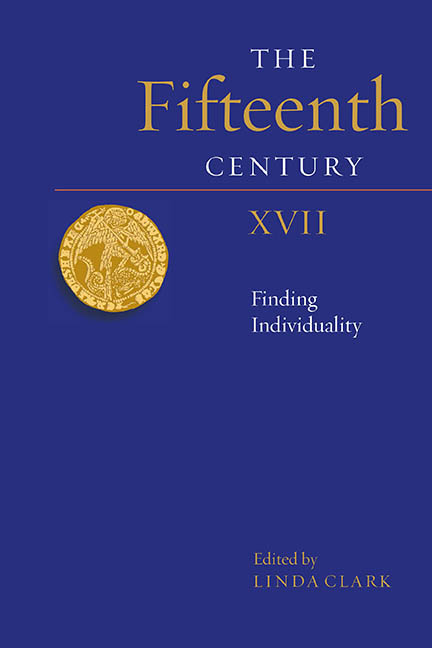Book contents
- Frontmatter
- Contents
- Contributors
- Preface
- Abbreviations
- Royal Wills, 1376–1475
- Propaganda, Piety and Politics in the Fifteenth Century: Henry V’s Vernacular War Letters to the City of London, 1417–21
- ‘To Be of Oon Demeanyng and Unite for the Wele of Your Self and of the Contre There’: Yorkist Plans for the Lordship of Ireland, the Last Phase
- A Mirror for a Princess: Antoine de la Sale and the Political Psyche of Margaret of Anjou
- Margaret of Anjou and the Language of Praise and Censure
- On ‘Peyne of their Lyfes … they Shuld no Verdit gif, but if they Wold Endite the Seid William Tresham of his Owen Deth’: the Murder of Lawyers in Fifteenth-Century England
- ‘Stond Horeson and Yelde thy Knyff’: Urban Politics, Language and Litigation in Late Medieval Canterbury
- ‘In to the Sterre Chambre’: Female Plaintiffs Before the King’s Council in the Reign of Henry VII
- Index
- Contents of Previous Volumes
On ‘Peyne of their Lyfes … they Shuld no Verdit gif, but if they Wold Endite the Seid William Tresham of his Owen Deth’: the Murder of Lawyers in Fifteenth-Century England
Published online by Cambridge University Press: 19 August 2020
- Frontmatter
- Contents
- Contributors
- Preface
- Abbreviations
- Royal Wills, 1376–1475
- Propaganda, Piety and Politics in the Fifteenth Century: Henry V’s Vernacular War Letters to the City of London, 1417–21
- ‘To Be of Oon Demeanyng and Unite for the Wele of Your Self and of the Contre There’: Yorkist Plans for the Lordship of Ireland, the Last Phase
- A Mirror for a Princess: Antoine de la Sale and the Political Psyche of Margaret of Anjou
- Margaret of Anjou and the Language of Praise and Censure
- On ‘Peyne of their Lyfes … they Shuld no Verdit gif, but if they Wold Endite the Seid William Tresham of his Owen Deth’: the Murder of Lawyers in Fifteenth-Century England
- ‘Stond Horeson and Yelde thy Knyff’: Urban Politics, Language and Litigation in Late Medieval Canterbury
- ‘In to the Sterre Chambre’: Female Plaintiffs Before the King’s Council in the Reign of Henry VII
- Index
- Contents of Previous Volumes
Summary
On the night of 23 October 1455 a leading apprentice-at-law, Nicholas Radford, was murdered outside his manor-house at Upcott in Devon by the sons and servants of his former patron, Thomas Courtenay, earl of Devon. One context for this crime, notable for the status and wealth of its victim and infamous for its duplicity and brutality, was a purely local one: it was an episode in an orgy of violence unleashed by the Courtenays in their escalating rivalry for local hegemony with the lawyer's new patron, the recently ennobled William, Lord Bonville. Yet the murder had a broader context. Radford was one of the most senior lawyers to meet a violent end in the fifteenth century, but he was by no means the only one. Although there is no record of any judge or sergeant-at-law suffering a similar death, there are grounds for thinking that members of the legal profession, of the rank of apprentice and below, were significantly more likely to fall victim to fatal violence, if deaths in battle are excluded, than other members of the county gentry. Such a belief is necessarily impressionistic; nonetheless, it is striking how high a percentage of known gentry murder victims in this period were lawyers. For example, 23 of the 2,844 Members of Parliament of the period 1422–61 are known to have been murdered, and ten of them, Radford among them, were lawyers. Since no more than a fifth of the MPs were men of law, this is about twice the number one would have expected from an unbiased distribution of victims. Several qualitative considerations can be adduced to explain this apparent vulnerability, for lawyers attracted hostility both on their own account and as the agents of others. Their routine resort to the restricted land market, by which they converted the profits of their profession into social promotion, meant that they were more frequently involved in disputes than more established landowners. Equally significantly, their understanding of, and ready access to, the mechanism of royal justice made them difficult opponents, an advantage that might drive rivals to the sort of violent and vengeful extra-legal measures that society both overtly condemned and covertly condoned. They also routinely exposed themselves to danger in the physical and functional spaces they habitually inhabited.
- Type
- Chapter
- Information
- The Fifteenth Century XVIIFinding Individuality, pp. 99 - 114Publisher: Boydell & BrewerPrint publication year: 2020



